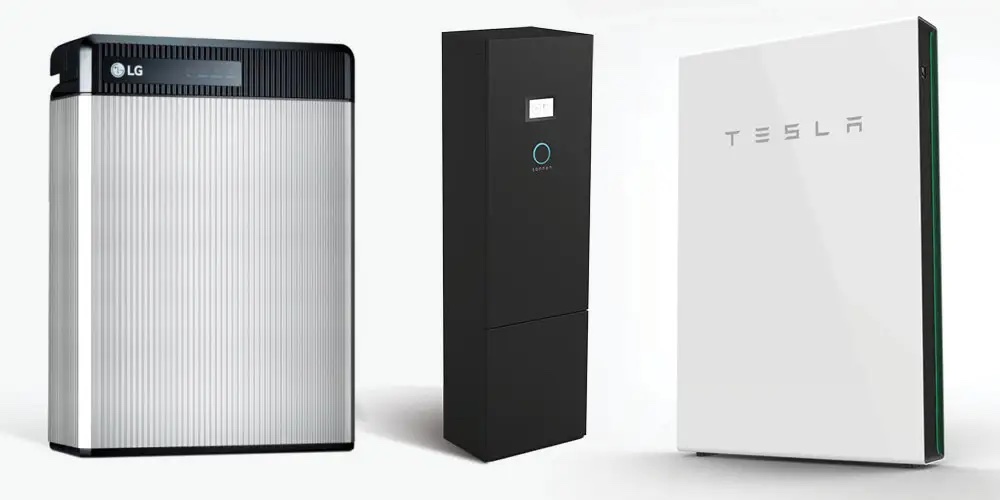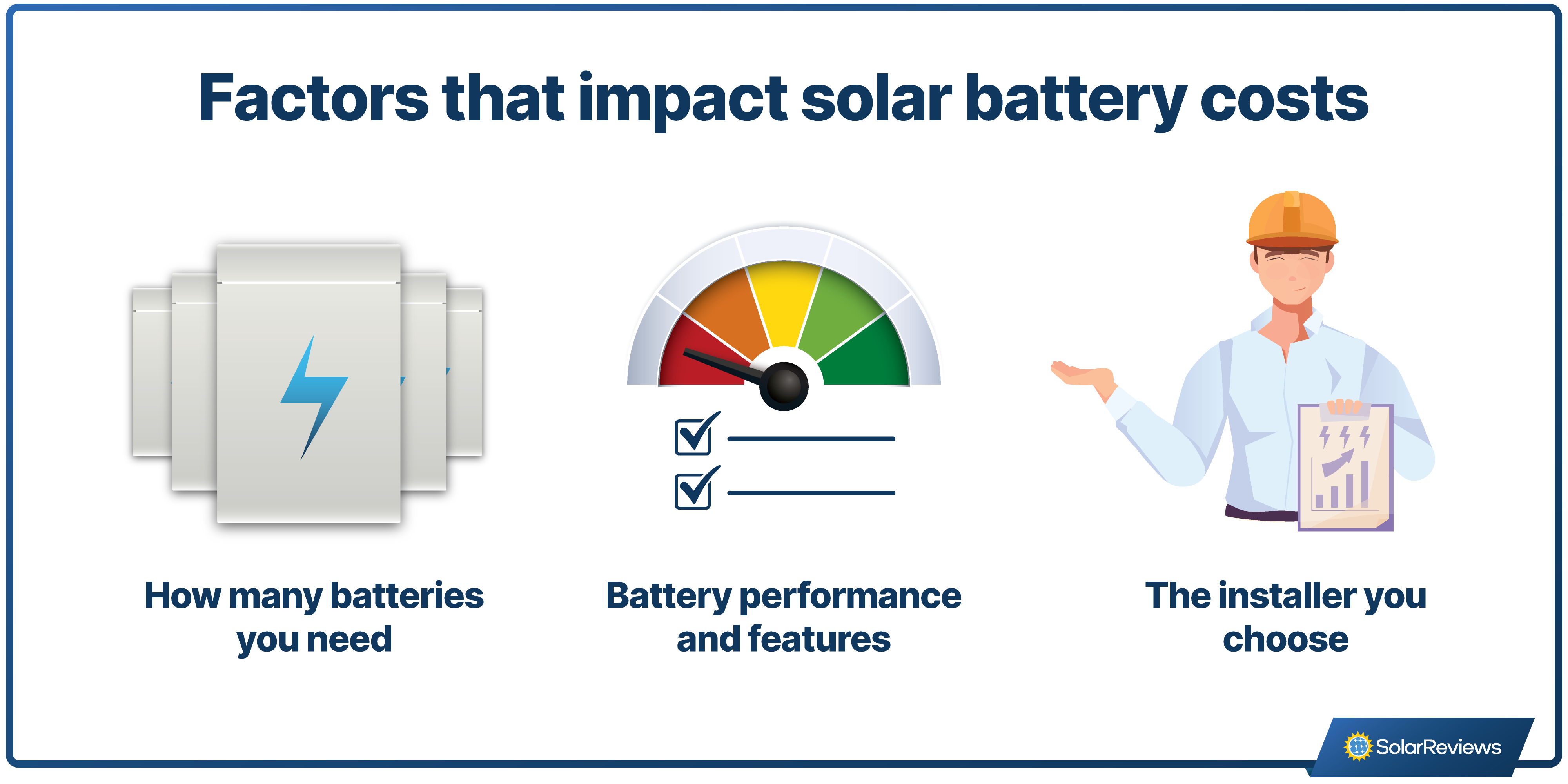Updated 10 months ago
Solar Batteries: Are They Worth the Cost?
Written by
Catherine Lane

Find out what solar plus storage costs in your area
Solar batteries store excess solar energy generated by solar panels to be used when the solar system isn’t producing energy or during a power outage to keep key appliances running.
While solar batteries have key benefits, like providing backup power, reducing reliance on the utility, and potentially saving more money on electricity bills, they come with a hefty price tag. You can expect to pay at least $12,000 to potentially upwards of $20,000 to install a single home battery.
Batteries are a good investment for homeowners whose utility company doesn’t buy solar power at the full retail price for electricity, want access to backup power, or want to maximize their renewable energy usage. If your utility has full retail net metering or you don’t need backup power, a battery probably isn’t worth it for you.
How much do solar batteries cost in 2025?
Many of the best home solar backup batteries will cost somewhere between $12,000 and $20,000, but the total cost will vary depending on the battery you choose and the difficulty of the installation.
Battery | Estimated equipment cost |
|---|---|
$10,000 | |
$9,200 | |
$9,000 | |
$8,000 | |
$9,500 |
The price of a Tesla Powerwall is usually much lower than other battery brands, but it will depend on the installer you choose.
Are there solar battery incentives?
There are a number of solar battery rebates and incentive programs available throughout the country.
The biggest incentive is the federal solar tax credit available in all 50 states. The tax credit equals 30% of installation costs and reduces what you owe in federal income taxes. Most solar battery installations will earn a federal tax credit of about $4,500!
Aside from the tax credit, utilities and states are opening more battery programs. Some are rebates that reduce the upfront cost of a battery, like California’s SGIP program. Others are virtual power plant programs, where the utility company pays you for access to the energy stored in your battery when grid demand is high.
Learn more: Complete guide to solar battery rebates and incentive programs
Beware of additional costs. There may be additional upgrades you need to get a solar battery installed. The most common is installing a sub-loads panel, which can add $1,000 to $2,000 to your costs. Sometimes called critical loads or backup panels, the sub-loads panel is basically a smaller version of your main breaker panel that holds the circuits that your battery backs up.
What impacts the cost of a solar battery installation?

There are a number of things that impact what your battery will cost, like the number of batteries you install, the battery itself, the installer’s labor costs, and where you live.
1. How many batteries you install
This seems like a no-brainer, but the more batteries installed, the higher the solar energy storage system costs. The number of solar batteries you’ll need depends on:
How many kilowatt-hours of energy you use
The storage capacity of the battery
How many appliances you want to power
How long you want to power your appliances
In most cases, in the event of a power outage, one to two solar batteries will hold enough stored energy to cover your energy needs and provide backup power to a few key circuits.
2. Battery characteristics and features
Just like everything else you buy, the brand that you choose will impact the pricing of the battery. This is because different brands offer different services and have different manufacturing processes. You can get a cheap battery from an unknown brand, but we always suggest using a reliable, trusted brand.
The type of battery will also affect how much it costs. Most of the time, when people talk about solar batteries, they talk about lithium-ion batteries, which are expensive but have the best performance features. There are also lead-acid batteries, which are cheaper but not as powerful, and are mostly used in off-grid set ups.
Batteries with advanced features or integrated inverters will likely cost more than basic models. The performance specifications will also make a difference. A battery with a high storage capacity or power output may come at a higher price point.
3. Labor costs and local market
The amount of labor required to install your battery system will also impact the price of a home solar battery installation.
If the battery is installed at the same time as the solar panels, the labor costs could be a bit lower because all of the electrical work and permitting associated with the solar system and battery system will be completed at once.
However, if the battery is being added to the solar panel system after the fact, labor could cost more, as new permits will need to be filed, more incentive forms may be required, and some additional electrical work may need to be done to connect the battery to the existing solar panels.
Your battery system cost will also depend on the installer you choose and the local market. If batteries are in high demand, installers may charge more for the units in stock.
How solar batteries work
Solar batteries store the extra solar energy your panels produce that you don't immediately use so that you can draw from it later.
Solar panels generate the most electricity during the middle of the day when homes generally use the least amount of energy. When installed with a battery, the panels can send extra energy made in the afternoon to the battery. Then, after the sun sets and the panels no longer generate electricity, the house draws power from the battery.
Perhaps the biggest benefit of solar batteries is that they can power appliances when the power goes out. If the grid is down, the battery fires up and sends electricity to appliances it’s designed to run. Here are some of the pros and cons of solar batteries:
Pros
-
Backup power source
-
Increase energy independence
-
Decrease carbon footprint
-
Potential electric bill savings
Cons
-
High upfront costs
-
Not practical for whole-home backup
-
Take up space
-
Long payback period
Are solar batteries worth it?
By themselves, solar panels are often worth the cost because they can directly reduce your electricity bills. Solar batteries, on the other hand, can make economic sense, but they usually just add peace of mind. Whether a battery is worth it depends on how much you value what you the benefits it can provide.
If you want a source of backup power, a battery is definitely worth considering, especially if you live somewhere that experiences frequent power outages. Unlike a gas generator, you don’t need fuel to fill up a battery, and they’re incredibly quiet.
If you want to increase electricity bill savings, you’ll need to look at your state and utility solar billing policies. Batteries won’t save you any additional money if your utility has a full-retail net metering program. You can see some savings if your utility requires time of use billing, but the additional savings could be minimal, depending on the rates.
Overall, batteries are worth it for homeowners who want a backup power source, who don’t have full-retail net metering, or who live somewhere with substantial battery rebates and incentives.
The best way to see if solar storage is right for you is by getting quotes from local solar installers. Not only can you compare installation prices, but they’ll help you figure out if battery storage meets your needs.
Solar battery FAQs
Catherine is a solar industry analyst and content manager with five years of experience researching and reporting on residential solar. As the former Written Content Manager at SolarReviews, she led a team producing informative content to help homeowners make informed decisions about solar investments. Her expertise has been featured in Solar Today Magazine and Solar Industry Magazine, with insights cited by major outlets including Forbes and Bl...
Learn more about Catherine Lane